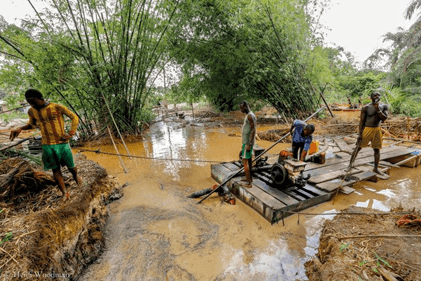A Civil Society Organization called Active Research Network for Environmental Governance (ARNEG), has expressed key concerns about the Prof. Frimpong Boateng’s 36-page Inter-Ministerial Committee on Illegal Mining (IMCIM) report.
In a statement released by the Policy Lead, Climate Finance & Energy Transition Kwesi Yamoah Abaidoo, ARNEG says the issuance of concessions in forest reserves for mining is an affront to environmental protection and should by no means be countenanced.
Below is the full statement;
THE PROF. FRIMPONG BOATENG IMCIM REPORT CONUNDRUM
*Active Research Network for Environmental Governance (ARNEG)* expresses major concern about the Prof. Frimpong Boateng’s 36-page Inter-Ministerial Committee on Illegal Mining (IMCIM) report. While this report has gained traction among several stakeholders in recent times for various reasons, ARNEG exposes the sustainability and policy gaps presented in the IMCIM report.
*Observations*
• Issuance of concessions in forest reserves for mining purposes is an affront to environmental protection and should by no means be countenanced. ARNEG regrets the position of the Forestry Commission to issue concessions to mining companies to extract mineral resources from our fast-depleting forest reserves. The result of this decision has been the intense pollution of our water bodies.
• Political class neck-deep involvement in the Galamsey activities speaks volumes about how approaching Galamsey goes beyond “paper works”. Enforcement of decisions by the IMCIM is noted to have been interfered with by the political class who had ties with illegal mining operators.
*Policy Implementation Gap*
• The establishment of IMCIM was a strategic policy direction, however, the organisational structure of the committee was an underlying factor for the internal conflicts and politics.
• Absence of robust Monitoring and Evaluation scheme among IMCIM members. If members of the IMCIM were assigned specific tasks and duly monitored and evaluated, the committee would have been much more effective.
• The non-migration of the Forestry Commission and partial migration by the Minerals Commission on the GalamStop platform was contributing factor to the IMCIM’s inability to realise its goals.
• While the Alternative Livelihood programme initiative is commendable, poor implementation of the alternative livelihood programme in mitigating illegal mining is partly to blame for indigenes to return back to Galamsey pits.
• The indictment of Security agencies involved in providing security was another reason for the inability of the IMCIM to realise its mandate as expected.
Recommendations
• Government should demonstrate much political will and commitment to tackle illegal mining.
• Government should always consider a bipartisan approach in confronting threats to our environment and livelihoods in the mining sector.
• Government should empower mining regulatory agencies with sufficient sophisticated equipment to aid them in discharging their mandate in Galamsey-prone communities.
• The Forestry Commission should as a matter of urgency reconsider and recall all permits issued to mine in forest reserves.
• Government should also discourage the creation of political programmes that existing institutions are capable of handling. For example, YEA should be tasked to handle the alternative livelihood programme rather than creating a new institution to handle the alternative livelihood programme.
Signed
Kwesi Yamoah Abaidoo
(Policy Lead, Climate Finance & Energy Transition)
+233205267426
Source: newsghana.com.gh

